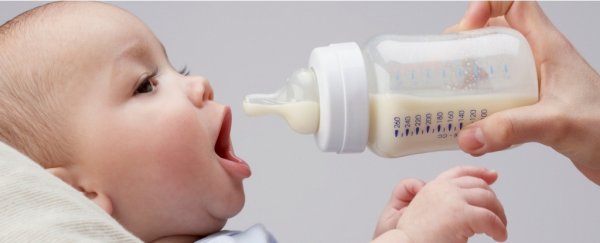Scientists are beginning to explore whether poop transplants could help rebalance the guts of babies born via Caesarean section.
Growing evidence suggests infants born vaginally and those delivered by C-section may start life off with different gut microbiomes, which could lead to health problems later in life.
Some scientists think this is because newborns are missing out on the germs from their mother's vagina, skin and intestines, while others think it has more to do with different factors, like antibiotics given to mothers after a C-section.
Now, researchers have proposed a somewhat radical solution. A small proof-of-concept pilot study has shown that diluting a mother's poop in breast milk and feeding it to a child born by C-section may result in a more 'natural' microbiome.
To be very clear, this is absolutely not a suggestion for soon-to-be parents to replicate at home. The basic concept of "bacterial baptism" is founded on shaky science and requires far more research.
While 'vaginal seeding' has grown in popularity over the years, there is still no clear evidence that wiping a baby with fluids from the mother is either safe or effective.
Indeed, this new pilot study found "vaginal swabbing does not correct the [C-section-induced] microbiota imbalance."
"This is not surprising because vaginal bacteria do not normally colonize the infant gut," the authors write.
But their results suggest that poop might. In the pilot study, the babies of seven mothers who opted for C-sections were given faecal microbiota transplants in milk shortly after birth.
These poop transplants were carefully screened for any dangerous pathogens, and the babies had their microbiota tested once at birth and again at two days, one week, two weeks, three weeks, and three months.
No control group was used; the results were instead compared to global publicly available microbiota datasets, including experimental vaginal swabs.
That said, at three weeks of age, the authors found babies who were given poop transplants had gut microbiomes similar to babies born vaginally.
In other words, the biggest difference between vaginally born and C-section-delivered infants could very well be "the ubiquitous lack" of bacteria from a mother's intestines.
A vaginal swab, therefore, might not restore these important germs. To do that, we need a swab of bacteria from further back.
"This was not designed as a safety study, but we found it to be effective and supporting the concept of vertical transfer from mother to baby," notes microbiologist Willem de Vos, who works at the University of Helsinki in Finland, and Wageningen University in the Netherlands.
"However, it's very important to tell people that this is not something they should try on their own. The samples have to be tested for safety and suitability."
During poop screening, the authors found pathogenic microbes in nearly 30 percent of the samples. They even found a case of herpes and suspected hepatitis.
That's a high probability of spreading harmful microbes to a child, so trying to do this at home could be extremely dangerous.
For similar reasons, both the British Medical Journal and the United States American College of Obstetricians and Gynecologists caution against vaginal seeding as it could introduce harmful pathogens to babies, including herpes simplex virus, chlamydia and gonorrhea.
Meanwhile, the benefits of such interventions are not clear. Studies on whether C-section deliveries are linked to increased immune issues later in life have produced mixed results.
Some large cohort studies have shown no link to specific diseases such as type 1 diabetes, while a recent Danish study of over 2.5 million births found an increased risk of inflammatory diseases.
Whether or not this is caused by a lack of exposure to vaginal or faecal fluid remains to be seen, but given that many women in labour also have bowel movements, the new findings suggest we shouldn't rule out the idea of a poop transplant.
"There's a reason the orifice for having babies is next to the anal orifice, in all vertebrates," microbiologist Maria Gloria Dominguez-Bello from Rutgers University told Science News.
"This is natural selection, not random. And it's a clear message from nature telling us, 'We want the newborns to be exposed to faeces.'"
The study was published in Cell.
